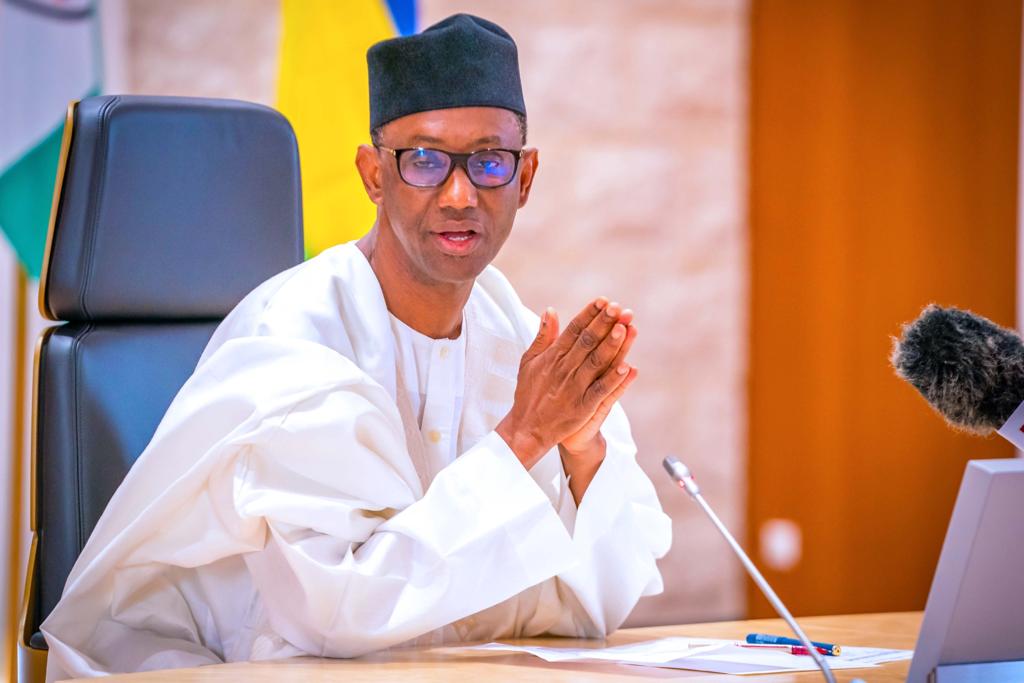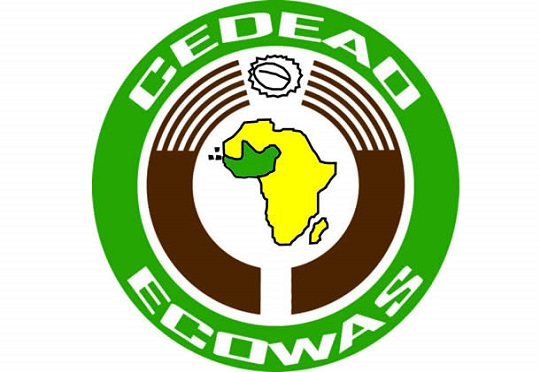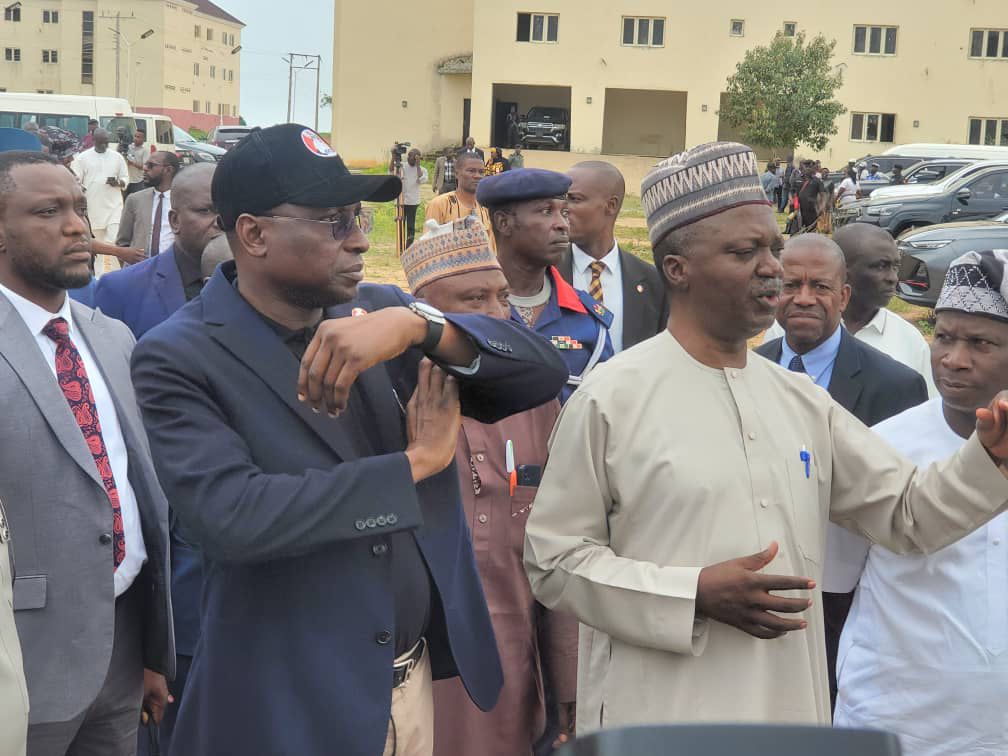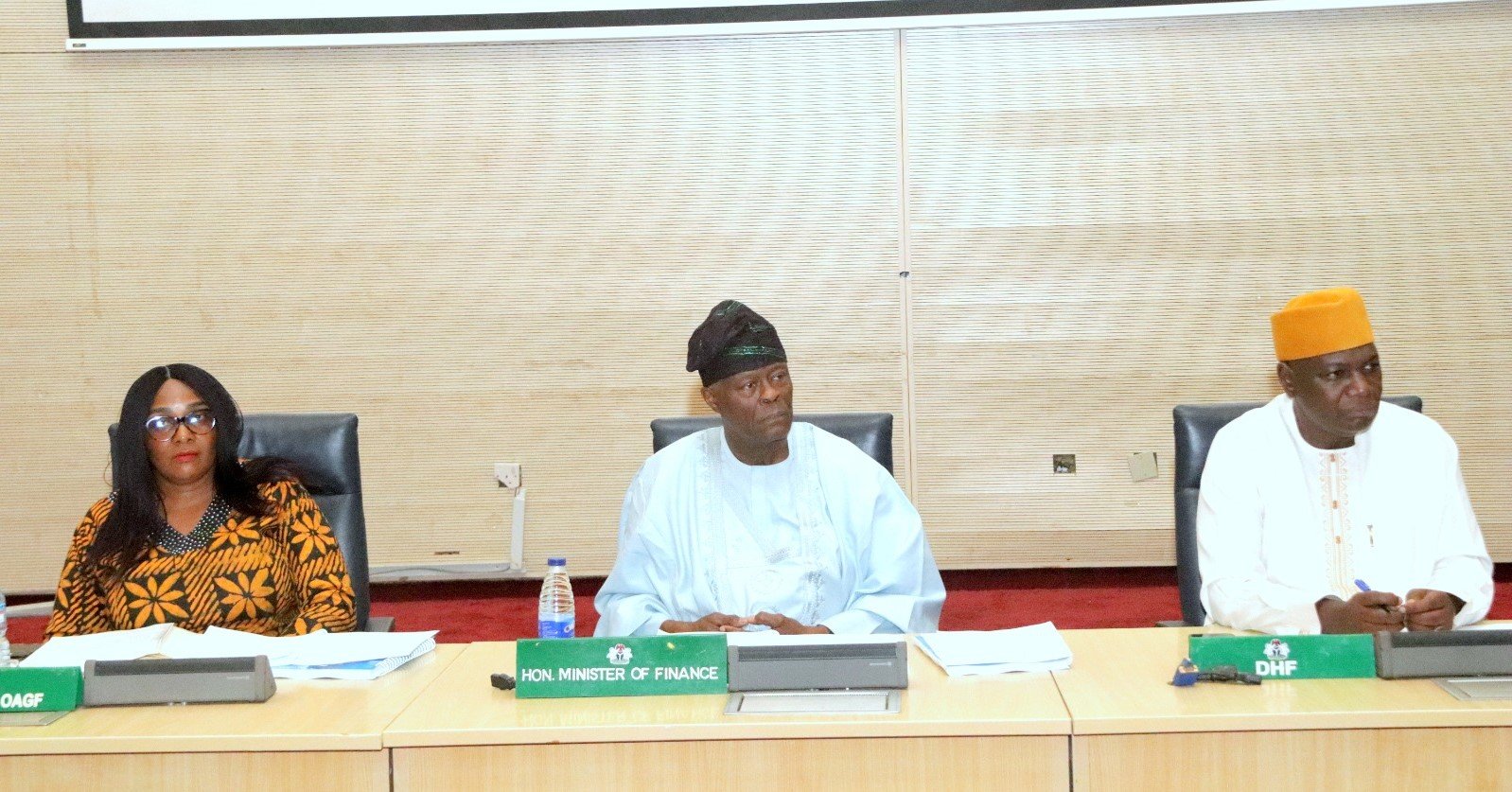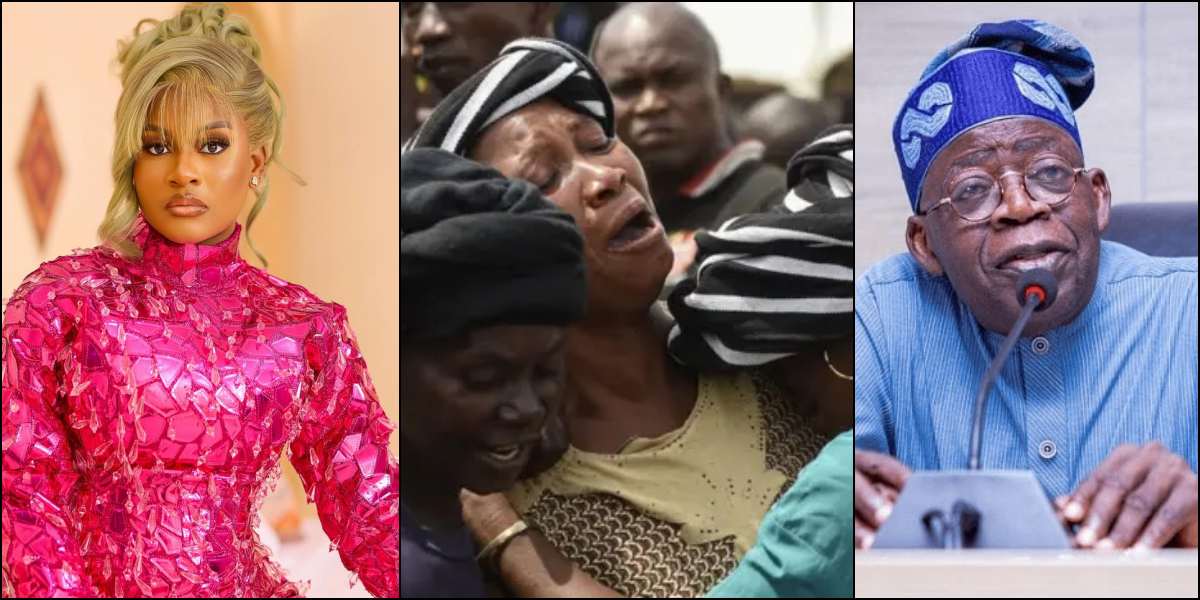Finally, A Stoic Looking Tinubu Journeys into Benue's Wounded Soul
President Bola Tinubu Wednesday’s journey to Benue, a state which has been under the heavy yoke of uncurbed violence by marauders, went beyond symbolism, write Emmanuel Addeh and George Okoh
It was not just a visit; it was a reckoning long overdue. When President Bola Tinubu touched down in Benue State yesterday, he entered not only a physical landscape but an emotional terrain scorched by months of grief, anger, even abandonment.
The air was heavy with the weight of loss: communities decimated by gunmen, mass graves hastily dug, families torn apart, and a people desperate for reassurance that their government still sees them.
For months, the cries from Nigeria’s food basket had gone largely unanswered, seemingly, at the highest level. But yesterday, the President stood on the very soil where blood had soaked into farmland, where classrooms had emptied not from holidays but from horror.
As expected, Tinubu came bearing promises of justice, security, and healing in a place where hope has grown brittle. The visit was more than ceremonial. It was a test of his presidency, and a moment that demanded more than words.
Yet among the rubble, there flickered a fragile flame of resilience. It was that fragile ember that Tinubu went to fan, to let the people of Benue know they are not abandoned in their darkest hour. It was hope that finally, the voice of the nation was being heard in Yelwata, Logo, Ukum, and beyond.
As it were, Tinubu carried with him the solemn task of rebuilding what violence had shattered; not just structures, but hearts and trust.
Between Desperation and Hope
President Tinubu arrived in Makurdi amid palpable tension. The land, once Nigeria’s breadbasket, has become ground zero for grief and fear. Trails of blackened grain sacks and charred granary doors stared out from the wreckage, ghostly reminders of lives lost and livelihoods destroyed.
His convoy emerged onto the the tarmac in Benue, a state under siege after about 200 villagers were slaughtered by suspected herders only two nights earlier. Homes were gutted, cattle stolen or killed, with over 3,000 displaced families: men, women.
Tinubu’s arrival marked the first such presidential presence in Benue since 2023, a long-overdue acknowledgment of the suffering there. His step onto Benue soil carried both the weight of two years’ silence and the burden of massive expectations.
Confronting the Carnage
Upon disembarking, Tinubu was met by Governor Hyacinth Alia and leaders of traditional communities silhouetted against the cloudy light. Their faces, etched with grief and resignation, bore witness to unrelenting violence.
Seemingly overwhelmed with the level of carnage, Tinubu spoke quietly to grieving mothers whose eyes had dried of tears and suffering. Behind him, the security apparatus, military and police chiefs conferred anxiously.
Tinubu told them bluntly: “Enough is enough.” He demanded fresh, aggressive strategies including targeted patrols, community protection units, and rapid-response teams stationed within kilometers of vulnerable villages.
He said that those responsible must be found and prosecuted, and that federal government forces must collaborate deeply with local authorities and traditional rulers.
Voices of Aggrieved
In a hall at the state Government House, Tinubu sat among victims and displaced persons, among them persons who lost wives and children in the raging terror, including the one at Yelwata.
Tinubu listened, somber, eyes fixed. Then he addressed the room: “No mother should bury a child in such an unspeakable way. No father should stand before flames that consumed his home and harvest. This administration will not stand aside.”
He announced immediate relief packages: emergency Naira distributions, medical outreach teams, repairs for damaged schools and clinics. Yet among the crowd, suspicion hung like dust in the wind.
Echoes from the Field
Outside the formal events, the backdrop remained bleak. Fields lay untended, commerce stalled, and fear tempered every gathering. Many had fled far from their homes. A recent study found that insecurity has slashed Benue’s crop and livestock output.
The decline ripples across national food supply, feeding anxieties far beyond Benue’s boundaries. In their hearts, citizens ask: will this pivot be pivotal, or another fleeting promise?
Children as Pun
The sight of schoolchildren lining the streets of Benue State during President Tinubu’s visit, uniformed, waving flags, and chanting rehearsed praises, raised troubling questions about the priorities of governance and being sensitive in moments of national distress.
In a region still bleeding from massacres, the decision to pull children out of class to stage a reception for a politician, no matter how high-ranking, revealed a misplaced sense of pageantry over purpose. It reduced children to props in a political theatre.
Yesterday’s action was simply emblematic of a broader disconnect between leadership and lived reality. Schools in Benue, particularly in vulnerable rural areas, have been repeatedly shut due to insecurity. Many pupils have no access to safe classrooms or even basic amenities like desks and books.
Yet some of the children cheering on the roadside may well be survivors of violence themselves, or have witnessed their schools torched and peers murdered. To co-opt them into ceremonial duties under the current conditions reflected not celebration, but tone-deafness.
Moreover, the optics of the decision were at best damaging, for want of a better word. While the President came to Benue to express solidarity with a grieving population, the forced joy and choreographed reception of children inadvertently muffled the message.
Instead of solemnity and reflection, what the world saw was a hollow show of unity, one in which the most vulnerable were, once again, made to perform.
It was not merely a logistical error; it was a moral one. Children belong in school, not on parade grounds. Especially not in a state where education is under siege, and where healing, not show;off is urgently needed.
Men and Women in Black
The visit of Tinubu to Benue witnessed a handful of people who were dressed in black wears to signify the feeling of mourning due to the heinous killing of over 200 people in Yelewata in Guma Local Government Area of Benue State.
Billboards adorned all major roads around the state capital with welcome messages. Many residents turned out after the early morning downpour to express their solidarity with victims of the Yelewata community despite the heavy presence of security men.
From the moment the presidential plane torched down at the Tactical Air Command (TAC) Airforce base in Makurdi the mood was that of despair and anger. Many residents turned out after the early morning downpour to express their solidarity with victims of the Yelewata community despite the heavy presence of security men.
The president after arriving,was received by the state Governor Alia, SGF, Senator George Akume and other past governors of the state, who drove to the state teaching hospital where they saw some of the victims of the attack.
The President who was visibly shocked at the sight of the survivors of the Yelewata killings expressed sadness over the attack while sympathising with those receiving treatment in the hospital.
One of those at the airport to welcome the president was the Executive Secretary of the Nigeria Shippers Council, Mr Pius Akutah, who disclosed that the president’s coming was timely and assuring.
He said: “The president coming will lift the mood of the people who have suffered this terrible tragedy and it is a very good thing that he came. We in Benue have continue to suffer these attacks and I expect that President Tinubu will put a stop to it because of his experience and profesionalism”
Many people on social media platforms expressed misgiving over the president’s coming, insisting that it will not have an effect on the senseless killings in the state.
Directive to Military
Tinubu also directed the security chief to arrest perpetrators of last Friday’s massacre in Yelewata community in Guma Local Government Area of Benue State. “Christopher… We need to get our ears to the ground.
“Let’s get those criminals. Let’s get them out,” Tinubu told the Chief of Defence Staff, Gen. Christopher Musa. To Alia, he said, “Your political enemies don’t want you to succeed…Are you just realising that?” He called on leaders from across the region to work together.
He added: “We cannot do without another. I will want us to create a leadership committee now to meet in Abuja to fashion out a strategy for lasting peace. And I am ready to invest in that peace,” he said.
Tinubu earlier visited persons recovering from last Friday’s attack by armed herders at the Benue State University Teaching Hospital.
Tinubu also directed the Inspector General of Police, Kayode Egbetokun to immediately arrest killer herders who perpetrated the heinous killing of people. The governors of Kwara, Imo, Kogi, Plateau, Ondo, and Nasarawa also attended the meeting.
Particularly, Tinubu called out the Inspector General of Police to know why arrests have not been made.
“How come no one has been arrested for committing this heinous crime in Yelewata. Inspector General of Police, where are the arrests? The criminals must be arrested immediately,” Tinubu said.
He urged the heads of the Department of State Services (DSS) and the National Intelligence Agency (NIA) to intensify surveillance and gather actionable intelligence to apprehend the perpetrators.
Advising Governor Alia on the importance of stakeholder management for peaceful and progressive governance, the President urged the governor to set up a peace committee in the state that will include former governors of Benue, elders, traditional rulers, federal government officials, and non-indigenes living in the state.
Tinubu urged Alia to allocate land for ranching and directed the Minister of Agriculture and Food Security to follow up.
President Visits Injured Survivors
Tinubu also visited victims of the recent brutal attack in Yelewata community in Guma Local Government Area of Benue State, where over 59 people were killed and many others injured.
Arriving at the Tactical Air Command, Nigerian Air Force Base in Makurdi around 12:58 p.m., Tinubu went directly to the hospital to see survivors of the massacre.
Following his hospital visit, the President proceeded to the new Banquet Hall of the Benue State Government House for a closed-door meeting with key stakeholders to address the spate of violent attacks in the state.
It formed part of a wider effort to find a lasting solution to the escalating crisis affecting several rural communities in Benue. Aside Alia, governors from the North-central region, National Security Adviser (NSA), Nuhu Ribadu, and Secretary to the Government of the Federation George Akume, were among other top officials.
He called for blood donations to support the injured receiving treatment at the Benue State Teaching Hospital, where he had earlier visited victims and medical staff.
While underscoring the importance of peace for sustainable development, President Tinubu implored the Governor to ensure Benue is peaceful, adding that the circumstances of his visit this time should not have been a reason to visit.
“I wanted to come here to commission projects, to reassure you of hope and prosperity, not to see gloomy faces. But peace is vital to development,” he said.
“The value of human life is greater than that of a cow. We were elected to govern, not to bury people”, he stressed. He charged Governor Alia with working with the federal government to restore peace.
“Governor Alia, you were elected under the progressive banner to ensure peace, stability, and progress. You are not elected to bury people or comfort widows and orphans. We will work with you to achieve that peace. You must also work with us.
“Not everyone will like you in politics. They hate me, too—like hell. But here I am, still your President. I made a promise to protect democracy, freedom, and prosperity, even for my abusers and accusers. That’s leadership,” the President emphasised.
Tor Tiv: It’s Full-scale Genocidal Invasion
Chairman of the Benue State Traditional Council, Tor Tiv, Orchivirigh Prof. James Ayatse, took time to address misinformation and mischaracterisation, saying that land grabbing was at the heart of the decades-long conflict.
“Your Excellency, it is not herder-farmer clashes. It is not communal clashes. It is not reprisal attacks or skirmishes. What we are dealing with here in Benue is a calculated, well-planned, full-scale genocidal invasion and land-grabbing campaign by herder-terrorists and bandits.”
He cautioned that mischaracterising the crisis had led to inadequate responses and accused some political actors of exploiting the situation for selfish gain.
“We hear that some politicians would even prefer that the crisis worsens, so it would serve as a basis for declaring a state of emergency. This is unfortunate. Any politician who prays for more people to die for such a project is working against the wishes of the people of Benue State,” he said.
Hope?
As the President left, planes slicing across a darkening sky, behind them remained thousands in Internally Displaced Persons (IDP) camps, injured bodies, traumatised children. Ahead lay new promises, reform, security, reconstruction.
But just promises are not enough. Tinubu’s visit must translate into swift action: villages secured, displaced returned, cattle destroyed and herders relocated, harvests resown.
If leadership is to be measured not by rhetoric but by results, then Benue’s journey back from the precipice must begin now, with deeds, not words.

